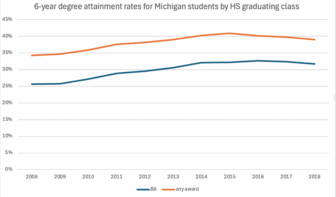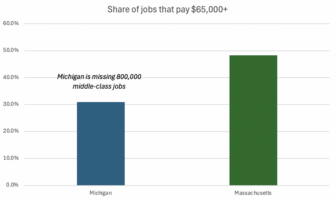
We are honored to have the opportunity to publish this column by Anthony P. Carnevale, the director of the Georgetown University Center on Education and the Workforce.
The economy is changing, but will Michigan change with it?
The United States has shifted to a postsecondary economy, in which good jobs are abundant for workers with at least some college education. Most Michiganders recognize the value of higher education in today’s economy. At the same time, the share of adults in Michigan who believe that a college education is important has fallen. In 2021, 80 percent of adults surveyed in the Michigan College Access Network’s State of the State Survey recognized the importance of college in Michigan’s labor market, 10 percentage points lower than in 2017.
It’s no surprise that uncertainty about the value of a college education is growing. Politicians from both parties have touted the long-promised return of manufacturing to states like Michigan — and with it, a resurgence of jobs for workers with no more than a high school diploma. To be sure, manufacturing still provides many good jobs in Michigan: these jobs make up 27 percent of the state’s good jobs, defined as jobs that pay at least $35,000 per year for workers ages 25 to 44 and at least $45,000 per year for workers ages 45 to 64. But the hard truth is that manufacturing is not coming back, and the manufacturing jobs of the future will go mostly to workers with postsecondary education. In fact, Michigan stands to lose 5,000 net manufacturing jobs by 2031, and 65 percent of the manufacturing jobs that remain will require at least some college education.
Blue-collar workers might find new hope in the bipartisan infrastructure bill, but the impending growth in infrastructure jobs brought on by the bill will be fleeting. Our research shows that growth in infrastructure jobs — most of which are filled by men — won’t last into the next decade. And even though the bulk of infrastructure jobs will go to workers with no more than a high school diploma and some training, roughly one-quarter of these jobs will require a college degree.
For most workers, having some college education is now the most reliable route to a good job. Eighty-two percent of good jobs in Michigan go to workers with education beyond high school, compared to around 80 percent of good jobs nationally. Our projections of jobs in Michigan show that, by 2031, almost 70 percent of all jobs in Michigan will require education beyond high school. Specifically, 35 percent of all Michigan jobs will require some college education or an associate degree, and 34 percent will require a bachelor’s degree or higher.
Despite the rising price tag, higher education remains a worthwhile long-term investment. Our research has consistently shown the payoff of postsecondary education in the labor market. Over a lifetime, a worker with a bachelor’s degree typically earns $1.2 million more than a worker with no more than a high school diploma.
Postsecondary education and training is now the most reliable pathway to the middle class. We must recognize the value of higher education in Michigan and promote it as a valid pathway to opportunity for Michiganders — not only because college is a good investment for individuals, but because an educated workforce is essential to Michigan’s future economic prosperity.






